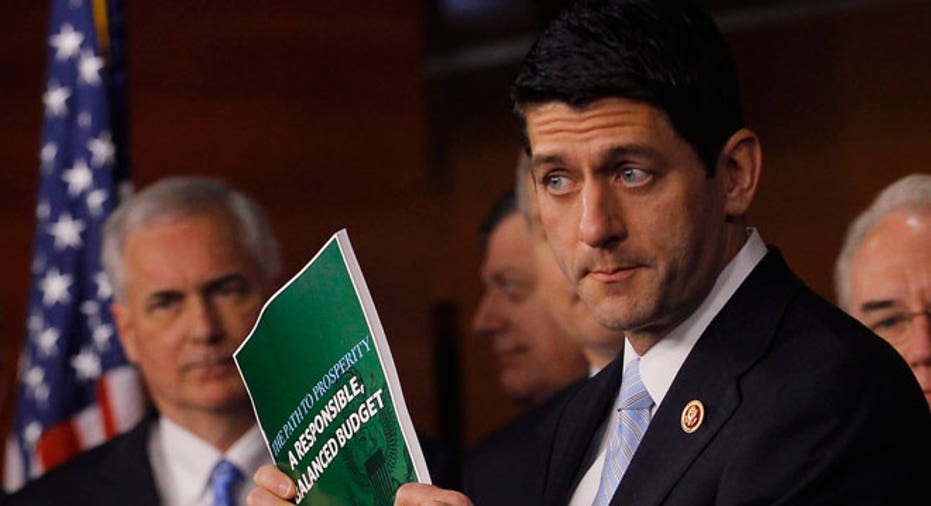Republican Budget Envisions Surplus in 10 Years

House Republicans plan to cut more than $4.6 trillion in spending over the next decade, resulting in a $7-billion surplus in 2023, according to their 2014 budget.
The Republican budget, again spearheaded by House Budget Committee Chairman Paul Ryan (R-WI), adds about $1.2 trillion to the national debt over the next 10 years – nearly $2 trillion less than last year’s plan.
Many of Ryan's proposals are identical to those in his previous budgets. While raising no new tax revenue, the Republican budget maintains the $620 billion in higher taxes agreed to in January’s budget deal.
“We don't want to refight the fiscal cliff," said Ryan on Fox News Sunday. "That's current law. That's not going to change."
The New Year's tax increase, a two-year extension of the 10-year budget caps agreed to in 2011 and requiring federal employees to pay more into their pension plans builds on his previous budgets and returns federal finances to surplus within 10 years.
“This budget provides an exit ramp from the current mess—and an entry ramp to a better future,” wrote Ryan in his budget outline. “We owe the American people a balanced budget. The less we owe to foreign creditors, the more of our future we will control.”
Ryan cuts nearly $900 billion in health-care spending, almost $1 trillion in other mandatory funding, and $1.8 trillion in spending from the president's health-care law over the next 10 years. The budget also assumes $700 billion in interest savings. Ryan counts no savings from winding down wars in Iraq and Afghanistan or overhauling Social Security.
His budget maintains the controversial premium-support overhaul for Medicare: Beginning in 2024, for those born in 1959 or later, the government would provide seniors funding to purchase private insurance or "the traditional fee-for-service option on a new Medicare Exchange," according to the Republican budget. Ryan's Medicare plan assumes competition among health insurers for seniors' subsidies will lower costs. If not, the Republican budget caps the growth of the subsidy. Democrats call this a voucher system and charge Ryan's plan would stick seniors with larger bills. They claim the subsidy amount would fail to keep pace with rising health-care costs.
The White House and congressional Democrats will very likely vilify Ryan's latest budget, much like his previous proposals, as a plan that sacrifices vital services for society's most vulnerable to protect the wealthy from tax increases and needlessly balances the budget.
When asked when the president's budget would balance federal income with spending, White House press secretary Jay Carney said Monday "It should not be deficit reduction for deficit reduction’s sake; the goal here should be economic growth and job creation."
Democrats have also warned Republican plans to slow domestic spending increases will harm economic growth. Ryan equated those predictions with the White House's warnings about the automatic spending cuts that began March 1.
"The other side will warn of a relapse into recession—just as they predicted economic disaster when the budget sequester hit. But a balanced budget will help the economy," wrote Ryan in Tuesday's Wall Street Journal. "Smaller deficits will keep interest rates low, which will help small businesses to expand and hire. It's no surprise, then, that the nonpartisan Congressional Budget Office believes that legislation reducing the deficit as much as our budget does would boost gross national product by 1.7% in 2023."
The House Republican budget increases military spending by about $500 billion over the next 10 years. Ryan justifies this spending increase calling national security "the federal government’s top priority." Though unwilling to refight January's tax-increase deal as a current law that will never change, Ryan again calls for the repeal of almost all of the president's health-care law. However, his budget leaves in place the more than $700 billion in Medicare cuts. "You have to remember, all of that money that was taken from Medicare was to pay for ObamaCare. We say we get rid of ObamaCare, we end the raid and we apply those savings to Medicare to make Medicare more solvent and extend the solvency of the Medicare trust fund," he said on Fox News Sunday.
Ryan's inclusion of the ObamaCare repeal demonstrates the likelihood it, and the Democrats' budgets, has in becoming law. Budget proposals are starting points for negotiations. With Republicans only in control of the House, Ryan's budget provides an opening bid to the White House and Senate Democrats on fiscal matters. Senate Democrats offer theirs Wednesday, when Senate Budget Committee Chairman Patty Murray (D-WA) unveils her budget.



















